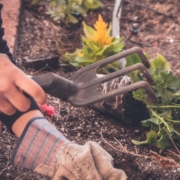By: Brian Harris
This is an attempt to dig into the Jesus difference that often becomes apparent in the lives of those who take up the invitation to be a disciple of Jesus the Christ. My last post explored being counter-culturally grateful, this one looks at being non-anxious, or perhaps more accurately, managing the anxiety we have in the light of our faith in Jesus. In short, following Jesus can make a difference to the way we face and work with anxiety.
The great thing about being a follower of Jesus is that you follow – you don’t set the direction or the pace. You listen and watch and respond to the lead of the one you are committed to following. It is why Christian leadership should always be different, for ultimately Christian leaders are led and are in the business of pointing followers to the path they believe Jesus is calling. That does not mean they are colourless puppets on strings without any original thoughts or creativity, but it does mean they constantly remember that they and those they lead are part of a much larger agenda and plan. Rather than considering this restrictive, they find it expansive and liberating. They know they can make a real difference, but they also know that it doesn’t all depend upon them. We are all part of something that is much bigger, and that is always an invitation to largeness of heart and vision.
We live at a time of high anxiety. Given the amount of change, it is understandable. You know the sources… war in the Ukraine, Covid, inflation, global warming, despotic leaders, terrorism, the growth of (often violent) extremism, the groaning health system and endless choices, each of which leaves you wondering if the ones you didn’t make would have been better – oh, and did I say change, and more change, and yet more change. You can never feel you have got on top of anything, because the moment you have, the goalposts shift yet again. It’s all a formula for uncertainty and anxiety – and the two are often linked. When we don’t know what it likely to happen, we become anxious and depending on our life experience, often assume the worst.
Christians face exactly the same challenges as anyone else here. We are certainly not exempt from inflation, Covid or any of the other stressors, so do we simply react in the same way? Obviously the answer is supposed to be no – but is there actually a Jesus follower difference here?
I guess it depends on how deeply our faith is a part of who we are. If journeying with Jesus is something that impacts our head, heart and hands, we will think, feel and act differently. And if it doesn’t, rather than add to our anxiety (oh dear, I’m not the disciple I am supposed to be!), be curious. Where are the blocks for you? And why are they there? And how could they be changed?
Let’s remind ourselves of some bigger picture truths. Dante wrote: “In His will – our peace”. If you are into meditation it is the sort of phrase to meditate on… breathe in to “In His will” – breathe out to “our peace” (and I am sure it is fine to change that to “my peace”). Our company greatly impacts our mood and response, so if we take time to sit quietly in the presence of Jesus, we will start to be shaped by the inner calm that comes from being with the resurrected one. After all, when you are with the One who was crucified and used it as an opportunity to conquer death – well problems start to be seen in a new light.
It’s not just that I am reassured by being in the presence of Jesus. When I remember to spend time with Him (and better still, why not make it a habit to spend the time?) I get a clearer sense of the purpose of my life, the opportunities that are before me, and what I am supposed to lean in toward and what I should back away from. There is a wonderful release when we hear God saying, “This is the way, walk in it” (Isa 30:21). Anxiety often comes because we don’t know what they are supposed to be doing or if there is any purpose to our life. We are all part of a search for meaning. A God centred mindset gets us to look upwards and outwards. It ensures we have a big enough view of life. Often the most anxious are worried about little things – but they are the things they have allowed to fill their agenda. A different set of priorities is transforming.
The agenda set by Jesus is radically different. He suggests that it is when we are willing to lose our life that we find it (Matt 16:25). When you are invited to lose your life you become a little less anxious when there are setbacks – after all, Jesus suggests that it is in this loss that we most truly find life. Now that is counter-cultural, and an important point of difference. In a world that encourages upward mobility Jesus invites us to downward mobility for the sake of God’s Kingdom. And what a strange Kingdom it is where the first are last and the last first (Matt 19:30 and 20:16 – note that Matthew quickly repeats the claim so that we don’t miss it). We worry because we don’t get enough recognition. It seems that Jesus worries when we get too much.
Perhaps at this point you want to throw in the “n but u” objection – nice but unrealistic. Isn’t that the point? We naturally gravitate towards paths that will ultimately stress and distress us. Jesus invites us to trust the goodness of God. He instructs us to do what doesn’t come naturally. This is not an exercise of passive resignation, but an active commitment to serve the purposes of God. When we do, we can counter-culturally and calmly recite: In His will – our peace… In His will – my peace.
Article supplied with thanks to Brian Harris.
About the Author: Brian is a sought-after speaker, teacher, leader, writer and respected theologian who has authored 6 books. After 17 years as principal of Perth’s Vose Seminary, Brian is now founding director of the AVENIR Leadership Institute, fostering leaders who will make a positive impact on the world.
Feature image: Photo by Tevin Trinh on Unsplash








